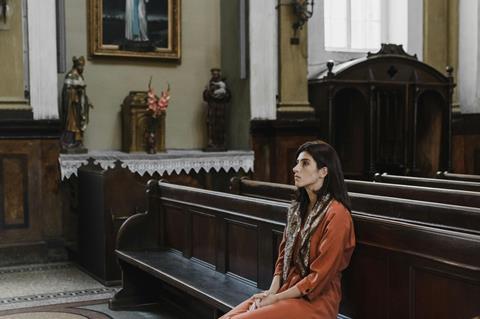Christian meditation is nothing to be afraid of. In fact contemplative and silent prayer is the most consistently emphasised aspect of Jesus’ own prayer life, argues Chris Whittington. The future of Christianity will not be louder, but quieter and deeper

A few years ago, I was invited to speak about Christian meditation (silent prayer) at a weekend camp for young Christians on a farm near my hometown of Cheltenham. Most of the weekend’s events were in a large barn, filled with laughter, guitars, and the warm energy of community. My session was scheduled in a small medieval church a few hundred metres away.
I wasn’t surprised to have been given a small slot late on Saturday afternoon. I knew that the ancient way of prayer I’d be speaking about would be unfamiliar to most. I would have been pleased with ten people turning up. A few minutes before the session began, 200 arrived, filling pews, choir stalls, even the floor. The little church was packed. I struck a small prayer bell. The clear, bright sound called everyone to silence.
After a few moments, I asked if anyone knew anything about intimate relationships. The room smiled. Then I asked if anyone had experienced the wonderful, heady excitement of meeting someone you think is absolutely captivating. You long to know and be known, to see them and talk and talk and talk. The silence deepened.
Then I asked if anyone had known the love where words fall away, where the depth and intimacy are perhaps best known and expressed in moments of silence, you simply look at your beloved, meeting their gaze — love speaking where words are no longer needed.
Then I asked: why would we ever imagine that prayer, our relationship with God, would be any different? After a stunned silence, someone asked, ‘Why has no one told us about this before?’ It’s a good question.
How did Jesus pray?
Immediately before teaching the Lord’s Prayer, Jesus teaches another way of prayer: “When you pray, go into your inner room, shut the door and pray to your Father who is in secret. And when you pray, do not keep on babbling like pagans, for they think they will be heard because of their many words. Do not be like them” (Matthew 6:6-8).
Many Christians are surprised to realise that this way of prayer reflects the most consistently emphasised aspect of Jesus’ prayer life in the Gospels — his habit of seeking solitude and silence in prayer to commune with his Father.
All Christians are taught the Lord’s Prayer. But when I ask groups of Christians (including ministers) how many of them have been taught the way of prayer Jesus teaches before it, the answer is that almost no one has.
If Jesus is our teacher, our model for prayer, this is quite extraordinary.
The spiritually hungry looking elsewhere
Earlier this year, the Bible Society suggested in its Quiet Revival survey that church decline might be reversing. Yet according to recent Church Times analysis, the Church of England remains smaller than it was before the pandemic, and recovery has slowed. Whatever the nuances, few seriously dispute the wider picture of institutional decline.
At the same time, recent surveys (the 2021 Census and 2022 Theos/YouGov study ‘The Nones’) show that, while fewer people now identify as Christian, a growing group who describe themselves as ‘non-religious’ still believe in God, a higher power, some form of the supernatural. The data points to a significant number who might be described as ‘spiritually-inclined but unaffiliated.’
The numbers of people seeking the depth-dimension of life and faith are as great as ever (perhaps even greater post-Covid). They are seeking peace, meaning, encounter with the sacred. And they are looking elsewhere.
Why? Because most people, most Christians, “have absolutely no idea that Christianity has anything to say about this, much less that it has its own vibrant contemplative tradition,” says Martin Laird, one of the most respected contemporary writers on Christian contemplative practice, “largely due to the fact that it has never been presented to them.”
When I ask groups of Christians how many of them have been taught the way of prayer Jesus teaches before it, the answer is that almost no one has
Somewhere along the way, much of Western Christianity appears to have forgotten the breadth and depths of what Jesus taught about prayer. We talk about God, debate about God, sing about God. But how often do we commune with God in the silent depths of our heart? The wisdom practices once taught for engagement with, and the interpretation of, life and scripture have been largely forgotten.
Revitalising Christianity
Despite the noise and unease of our times, the feared crumbling of institutions, the dominance of consumerism, materialism, the fever of digital life — it is clear that people are not turning away from spirituality, but quietly seeking ways to nurture it.
And yet, in their efforts to attract people, it sometimes appears that churches look to the marketplace (slogans, sleek branding, artisan coffee) and overlook the contemplative riches of Christianity, an ancient wellspring of wisdom from which many might drink.
In recent years, I’ve also witnessed something extraordinary — and I believe a quiet revolution is underway. At The School of Contemplative Life, we host free twice-weekly online meditation gatherings, following an ancient practice of the early Christian contemplatives known as the Desert Fathers and Mothers. No music. A few words. Then silent communion within the ‘inner room’ of the heart.
These gatherings have quickly become host to the largest online Christian meditation community in the UK. Many who join are not churchgoers. Some would not call themselves Christian or religious. Yet they are drawn to silence. They recognise the wisdom and healing to be found in this simple, ancient way of prayer.
In a preliminary study with the University of Derby, 87 per cent of participants said that, since practicing in this group, they felt a deeper connection with God; 83 per cent said their lives were more aligned with their values; and 76 per cent reported greater inner peace. As one person put it: “Peace now feels tangible, and possible, and present — not just an idealistic goal.”
At the beginning of Mark’s Gospel, we find Jesus waking before dawn and going to a deserted place to pray. Knowing what Jesus would be doing, Simon and the others go to find him and tell Jesus that everyone is looking for him. Jesus immediately suggests they should go to the nearby villages, where he can teach and heal (Mark 1:35–39).
The Gospels of Matthew, Mark and Luke all connect Jesus’ most distinctive way of prayer with his ministry of teaching, healing and the creation of community, like beams of light radiating from a single source, harmonious, inseparable.
‘Why has no one told us about this before?’ asked the young Christian.
There is no need for the most emphasised aspect of Jesus’ prayer life in the Gospels to remain one of Western Christianity’s best-kept secrets. We can share this precious gift with the world.
The future of Christianity may not be louder, but quieter, deeper. The answer may be found in praying like Jesus.
Chris Whittingdon is the author of The Missing Peace. For more information visit themissingpeace.org.uk



































No comments yet